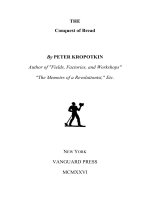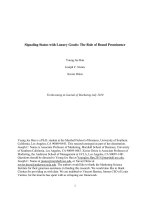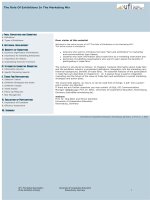Chapter 8: The Role of Power pptx
Bạn đang xem bản rút gọn của tài liệu. Xem và tải ngay bản đầy đủ của tài liệu tại đây (134.71 KB, 20 trang )
The Role of Power
Chapter 8
Outline
Role of Power
Rules for Using Power
Role of Power
Power defined:
•
Ability or official capacity to exercise control;
authority
•
Ability to influence or control others
Sources of Power
•
Information
•
Status
•
Social networks
•
Physical appearance
Rules for Using Power
The text describes 16 rules for using
power in negotiation. Each will be
discussed in the following slides.
Rule #1: Establish Credibility
Introduction by others
Biographical sketch
Take notes
Be a good listener
Demonstrate recall & understanding of
information
Suggest an agenda
Rule #2: Do Your Research
Smart talk – sounding confident,
articulate or eloquent
Stay abreast of content areas and read
a broad range of materials
Knowledge leads to confidence
Present information constructively and
with intent to help
Rule #3: Don’t Have All the Answers
Don’t flaunt your expertise
Help the other side remain confident (face
issues)
Utilize esteem-reviving comments
•
Useful when other side takes offense or
negatively reacts to statements
•
“If you don’t mind, let’s back up here to see if
I’ve misstated my intentions.”
•
“If I seemed to be abrasive a few moments ago…”
•
“I may have spoken too quickly”
Rule #4: Don’t Sweat the Small Stuff
Don’t push too hard for minor gains
Quibbling over small stuff creates bad
will
Bundle small items with others into one
package
•
Example – Negotiating relocation expenses
as part of a salary negotiation
Rule #5: Create Dependence
Create reliance
Identify what you have the other side
might want
Relationship between power &
dependence
•
Power A, B = Dependence B, A
•
Power of person A over B is equal to the
dependence of person B on A
Rule #6: Power of Who You Know
It’s not what you know but who you know
Identify how your negotiation counterpart
might perceive your references or
connections
•
Utilize when they are highly regarded and
perceived as credible sources
•
Make a subtle reference
Rule #7: Don’t Appear Overbearing
Show humility not arrogance
Enhance the “face” of your counterpart
•
“Now I see where you’re going with that
idea…It’s a good one”
•
“I hadn’t thought of it that way”
•
“You’re a step ahead of me on this one”
•
“That’s more in your area of expertise
than mine, so I’d like to hear more”
Rule #8: Use Time Strategically
Pace proposals so it fits the
circumstances and the other side’s
expectations
Mirror your counterpart’s style to pace
appropriately
Be flexible
Rule #9: Carefully Choose Context
The environment of negotiation can be
a powerful inhibitor or facilitator of
negotiation success
•
Food, room, lighting, temperature,
seating, etc.
Create the ambience or atmosphere
that is most conducive for each
particular negotiation instance
Rule #10: Threat is a Last Resort
Negotiators who use cooperative strategies have
higher joint gains than those who don’t
Those using more competitive strategies as demands
or threats fail to achieve optimum outcomes
Veiled threat – subtle and deniable
•
Use statements
•
Questions
•
Hypothetical scenario
•
Utilize to redirect discussion or prompt reconsideration of
an undesirable action plan
Rule #11: Don’t Play Same Hand Twice
Develop extensive command of
negotiation strategies or a repertoire of
strategies and tactics
Don’t utilize the same tactic/strategy
more than once – might be perceived as
predictable and less skilled
Rule #12: Remain Flexible
Constantly reevaluate the effectiveness
of your choices
Be prepared for anything
Utilize creative thinking and
experimentation
Rule #13: Understand Political
Landscape
Types of Political Environments
•
Minimally Politicized Arena – power possessed by those who
are truthful and demonstrate regard for their own
outcomes and those of others
•
Moderately Politicized Area – greater acceptance of behind-
the-scenes tactics so long as the goals of the group are
achieved
•
Highly Politicized Arena – conflict is frequent and often
pervasive – who you know more important that what you
know
•
Pathologically Politicized Arena – characterized by
frequent, often long-lasting conflict; high levels of distrust
Rule #14: Don’t Negotiate Alone
Have support of others – either present
or whom you can mention during the
negotiation process
“Friends in high places” are an
important part of evidentiary support
Rule #15: Don’t Become Flustered
Keep your cool
Attempt to redirect using framing
•
“That’s an interesting twist on things”
•
“You’ve obviously done your homework,
but let’s also consider…”
Preparation is key
Rule #16: Find the Soft Spot
Encourage others to open up
•
Gain disclosure of something private or
personal about your counterpart
•
Expression of trust
Identify true motivations and sources of
objections
Be patient and use probing questions
Attempt to satisfy some need









